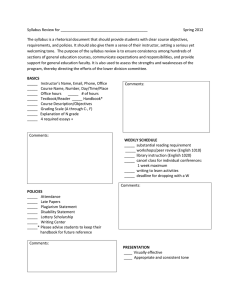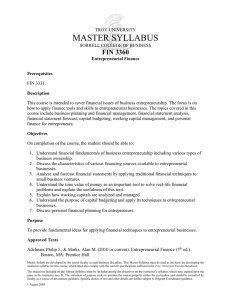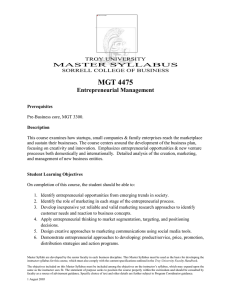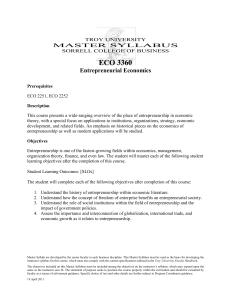ACT 3360 Entrepreneurial Accounting MASTER SYLLABUS
advertisement
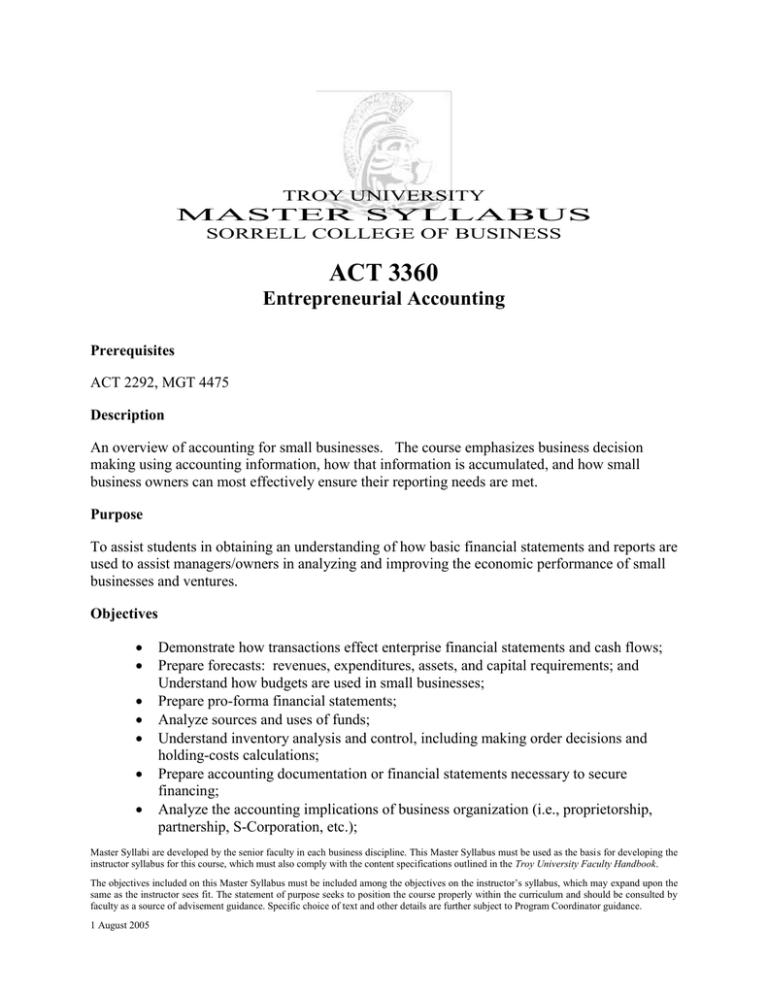
TROY UNIVERSITY MASTER SYLLABUS SORRELL COLLEGE OF BUSINESS ACT 3360 Entrepreneurial Accounting Prerequisites ACT 2292, MGT 4475 Description An overview of accounting for small businesses. The course emphasizes business decision making using accounting information, how that information is accumulated, and how small business owners can most effectively ensure their reporting needs are met. Purpose To assist students in obtaining an understanding of how basic financial statements and reports are used to assist managers/owners in analyzing and improving the economic performance of small businesses and ventures. Objectives Demonstrate how transactions effect enterprise financial statements and cash flows; Prepare forecasts: revenues, expenditures, assets, and capital requirements; and Understand how budgets are used in small businesses; Prepare pro-forma financial statements; Analyze sources and uses of funds; Understand inventory analysis and control, including making order decisions and holding-costs calculations; Prepare accounting documentation or financial statements necessary to secure financing; Analyze the accounting implications of business organization (i.e., proprietorship, partnership, S-Corporation, etc.); Master Syllabi are developed by the senior faculty in each business discipline. This Master Syllabus must be used as the basis for developing the instructor syllabus for this course, which must also comply with the content specifications outlined in the Troy University Faculty Handbook. The objectives included on this Master Syllabus must be included among the objectives on the instructor’s syllabus, which may expand upon the same as the instructor sees fit. The statement of purpose seeks to position the course properly within the curriculum and should be consulted by faculty as a source of advisement guidance. Specific choice of text and other details are further subject to Program Coordinator guidance. 1 August 2005 Master Syllabus: ACT 3360 2 Analyze the accounting implications of setting prices (i.e., cost components to consider, overhead, etc.); Define how internal controls can be implemented in small businesses; Approved Texts Wahlen, James M; Baginski, Stephen P.; and Bradshaw, Mark, Financial Reporting, Financial Statement Analysis and Valuation- A Strategic Perspective. Cengage publishing company ISBN 9780324789416 Supplements Entrepreneurial Accounting This book is about accounting and forecasting, information critical to determining the ultimate feasibility of a venture. We will teach you how to forecast and prepare the financial data required for a business plan. We examine a accounting and finance issues which are important to any entrepreneur. We do not assume that the reader has any knowledge of accounting or finance. There are no theories in this book; no ivory tower thinking; no academic musings. This is a hands-on, real world, grass roots, hard-nosed, description of how we have done it, how hundreds of other successful entrepreneurs have done it, and how you, too, can do it. It doesn’t matter if your dream is a not for profit organization, a new division of an established firm, a new product or service expansion for an existing venture, a new small business, a dot.com, an expansion into international waters, a foray into web selling, or a new governmental agency or operation. Whatever your idea, you must use independent data to prepare pro formas which demonstrate its potential. We think that you will find the book readable, enjoyable, and practical. That is our watchword. We all know entrepreneurs are dreamers, but they must dream dreams which are practical, and we will show you how to refine your dream until it meets that test. Troy University Faculty Handbook (2010): Section 3.9.2.8 [extract] — essential elements of the syllabus (somewhat modified for space): 1. Course title 2. Course number + section 3. Term 4. Instructor 5. Prerequisites 6. Office hours 7. Class days, times 8. Classroom location 9. Office location + e-mail address 10. Office telephone 11. Course description, objectives 12. Text(s) 13. Other materials 14. Grading methods, 16. General supports criterion weights, (computer works, make-up policy, writing center) mid-term grade 17. Daily assignments, reports holidays, add/drop 15. Procedure, course & open dates, dead requirements day, final exam 18. ADA statement 19. Electronic device statement 20. Additional services, statements 21. Absence policy 22. Incomplete-work policy 23. Cheating policy 24. Specialization requirements (certification, licensure, teacher competencies)



